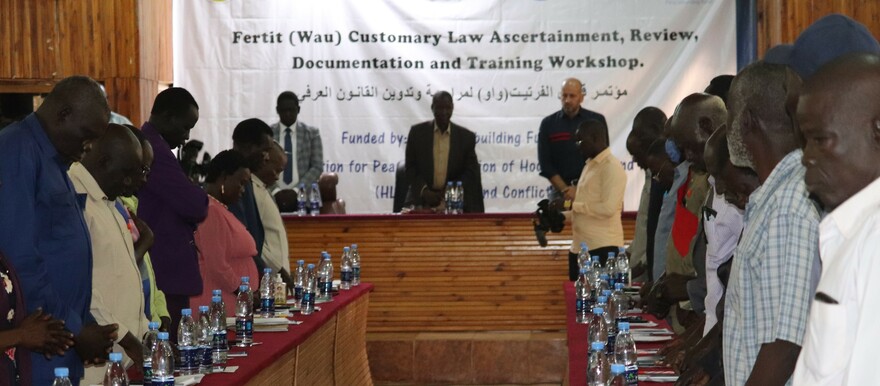A five-day customary law review and training workshop for the Fertit community in Wau County, Western Bahr el Ghazal State concluded on Saturday with at least 12 recommendations.
The workshop, which brought together the seven communities of Viri, Bor, Bai, Ndogo, Sere, Golo, and Bongo, is aimed at reviewing and documenting their customary laws and incorporating them into the state law.
Among the suggestions include continuous training for the chiefs on the importance of the new customary law, separation of traditional rulers from political affiliations, and endorsement of the customary laws into law by the state assembly, among others.
The customary law review and training workshop is being organized pursuant to the recommendation of an initial field assessment of the traditional justice systems and status of Housing, Land, and Property (HLP) issues conducted in both Wau County and the municipality in February and April 2022.
While reading out the recommendations, Marko Dominic, the representative of the Fertit, said his community unanimously called for the state legislators to pass their customary law and incorporate it into the state law.
“Number one, arrangement of special training for the traditional, local chiefs deserved as a priority of our recommendation, number two arrangement of more workshops for the customary law, number three traditional should be independent from politics and not be affiliated to any political party”, Dominic read.
Other recommendations included facilitation of Internally Displaced persons to return to their respective areas, translation of the workshop results into local languages and dissemination of the outcomes to various locations of the Fertit community.
Angelo Alberto, a member of the Fertit community, advised all tribes of Wau County to remain united to fight bad cultures that aim at destroying the norms of the Fertit people.
“I urged all people of Wau County tribes, I was not aware that the traditional norms of Fertit are similar, but today, I don’t see a reason to say there is Balanda Boro, Balanda Viri, Balanda is one, and for Ndogo, from today am call Ndogo, not with the name of Ndogo or Golo or Bai, there are called Rongo group because they are sharing the same culture,” he stressed.
He also appealed to the judicial system to expedite the process to forward their resolutions to the state assembly.
“I am urging the judiciary body to immediately forward our customary law to the parliament so that it is passed into law such that we can use it to rule ourselves as Fertit,” he said.
Ann Roko, a women representative, echoed the youth call and said the customary law should not remain on paper but should be implemented.
“Yes, we have put it on paper, let us take responsibly so that it is implemented within the community because if we do not implement this, the past impact will continue with our young generation,” Roko stated.
Charles Anthony Ngeberende, the State Minister for Local Government in his closing remarks, said the workshop will build trust and unity not only in the Fertit but the communities in South Sudan.
“This workshop is very important. It is organizing people in a group. It has organized the people in unity in the state and also at the level of the country,” said Anthony.
“We are not encouraging you for tribalism, let our sitting here not encourage people on tribalism, the level of tribalism in South Sudan is a big sickness than CORONA Virus, I called upon you to leave this workshop with unity and going to unite people who just know tribalism,” he added.
The customary law review and training workshop was organized pursuant to the recommendation of an initial field assessment of the traditional justice systems and status of Housing, Land, and Property (HLP) issues conducted in Wau County and the municipality in February and April 2022.




